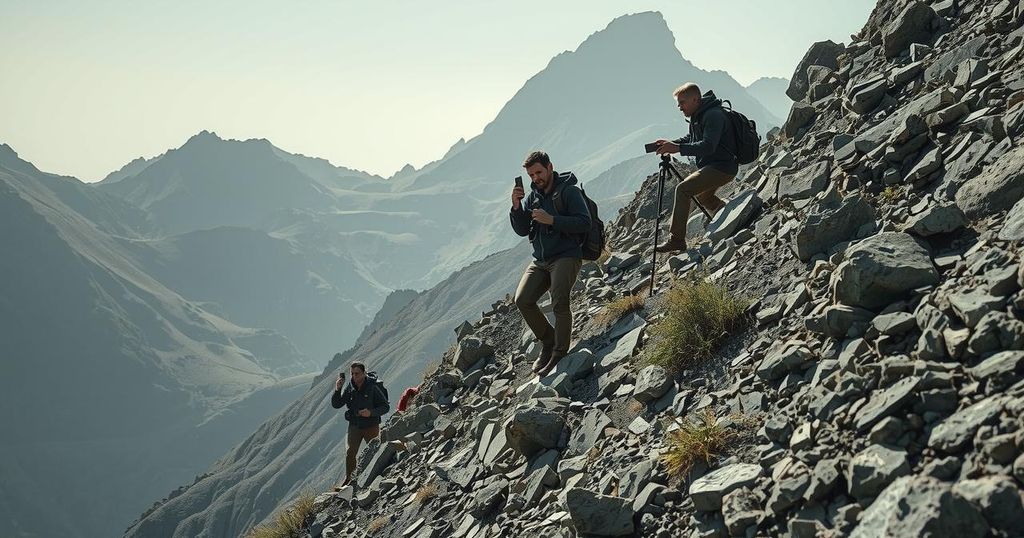World news
AF, AFRICA, ASIA, CAIRO, CHAD, CIVIL WAR, COMMITTEE TO PROTECT, COMMITTEE TO PROTECT JOURNALISTS, CONFLICT, DARFUR, EGYPT, EL - GENEINA, GAZA, GAZA STRIP, GEDAREF, HUMANITARIAN CRISIS, IBRAHIM, NOON, NORTH DARFUR, RAPID SUPPORT FORCES, REFUGEE CRISIS, REPORTERS WITHOUT BORDERS, RSF, SUDAN, TAWILA, UN, WAR, WEST DARFUR
Fatima Alavi
0 Comments
Sudanese Journalists Risk Everything to Report on Ongoing Conflict in Darfur
Local Sudanese journalists are risking everything to report on the ongoing conflict in Darfur. Since the war started in April 2023, at least 28 reporters have lost their lives, and many others face torture and displacement. Amid dire conditions, some journalists report undercover, determined to share the story of the atrocities, facing significant threats as their safety hangs by a thread.
Cairo (AFP) – Amid the ongoing conflict in Sudan, local journalists are taking significant risks to report on the dire situation. They often ascend mountains near the border, attempting to get a signal from Chad to reach the outside world—this is particularly vital since the war commenced in April 2023, which has led to a two-year blackout for communications. The atrocities unfolding in Darfur—including accounts of sexual violence, ethnic massacres, and mass displacement—are among the many issues these brave individuals strive to illuminate despite personal peril.
The death toll for reporters has risen alarmingly, with at least 28 journalists killed since the fighting between the army and the Rapid Support Forces (RSF). Many more have been detained under harsh circumstances, and countless have found themselves without basic necessities like electricity or internet. Noon, a 35-year-old freelance journalist, had to flee El-Geneina, the capital of West Darfur, after facing targeted threats following her reporting on RSF-led massacres where thousands of citizens were killed. “They raided my family’s house. They took all my equipment, my cameras, everything,” she recounted, recalling her harrowing experiences.
After several attempts on her life, she managed to escape with her family to the eastern state of Gedaref. Yet, even there, the risk persisted as she was arrested by government forces, accused of working with the RSF. She was coerced into signing a document requiring her to obtain government approval for her reporting. According to Reporters Without Borders, a staggering 400 journalists have fled Sudan since the war’s start, providing an unsettling backdrop for those who remain.
In Tawila, a city in North Darfur, photojournalist Ibrahim, who also preferred a pseudonym for security reasons, continues his work undercover. With UN reports stating that approximately 180,000 people are seeking refuge from RSF violence in the area, Ibrahim’s efforts are particularly vital. He fears for his life, stating, “No one can know what I do. If they find out, they’ll arrest me or take my phone.” Having been detained and tortured previously, he now locates himself in a diminished situation with limited tools for reporting.
As conditions deteriorate further, many journalists in Sudan find themselves in increasingly dire circumstances. For instance, veteran reporter Youssef, 62, has been forced to rely on farming to survive as his newspaper relocated operations to Cairo. “The last salary I received was at the beginning of 2024,” he shared, highlighting the devastating impact on journalists in the region. Youssef has faced direct confrontations with RSF fighters, resulting in an interrogation and temporary detention simply for being a journalist.
Both he and Ibrahim emphasize the lack of support from media organizations during these challenging times. Ibrahim has even turned a local coffee shop in Tawila into a makeshift newsroom, asking, “Who else will tell the world what’s happening in Darfur if we leave? No one else will tell these stories. No one can imagine the atrocities happening here.”
In summary, journalists in Sudan are enduring unimaginable risks to report on the ongoing war and the resulting humanitarian crises, highlighting severe threats to their safety and the ever-deteriorating media landscape in the region. With many facing violence, imprisonment, and even death, their commitment to uncovering truths remains unshaken. Despite the bleak circumstances, their determination to inform the world about the atrocities occurring in Sudan persists, a testament to their bravery and dedication in this perilous environment.
Original Source: www.rfi.fr




Post Comment